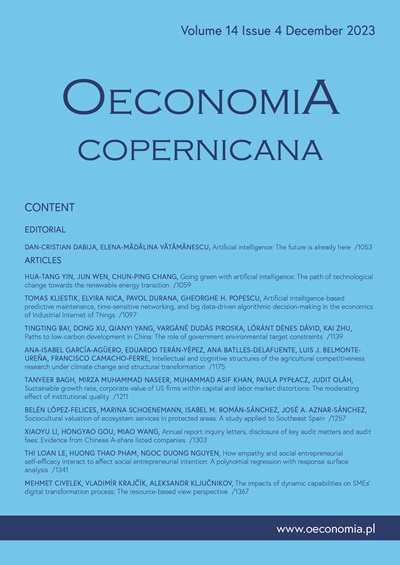动态能力对中小企业数字化转型的影响:基于资源的视角
IF 7.6
1区 经济学
Q1 ECONOMICS
引用次数: 7
摘要
研究背景:中小企业对其员工数字素养的关注,对提高员工数字素养的兴趣,以及确保其数字平台的安全,一直是其数字化转型过程中的主要问题。为了减少这些障碍,资源基础观(RBV)中包含的中小企业动态能力可能是一种有效的解决方案,因为它们可以帮助企业更具竞争力,并主动应对数字化过程中面临的威胁。本文目的:本研究旨在探讨中小企业的动态能力是否对其数字化转型进程有积极的促进作用。方法:根据本文提出的关系,运用有序Logistic回归分析对捷克中小企业进行分析。研究样本采用分层随机抽样和目的抽样的方法。研究数据是通过电话调查收集的。研究发现与增加值:本研究未发现中小企业动态能力与数字化转型过程之间存在正相关关系。虽然与数字素养相关的结果与数字化转型呈负相关,但安全行动与中小企业的数字化转型之间不存在显著关系。本文通过分析中小企业的各种动态能力,拓展了RBV对中小企业数字化转型的研究范围。此外,本研究认为中小企业高管的看法可以为他们在数字化转型中面临的问题提供有效的解决方案。与经验丰富的IT公司签订合资协议,与合作伙伴公司建立网络,在欧盟寻找融资机会,参加一些实践培训,并为本科学生提供实习机会,这些都可能使中小企业实现数字化转型的目标。本文章由计算机程序翻译,如有差异,请以英文原文为准。
The impacts of dynamic capabilities on SMEs' digital transformation process: The resource-based view perspective
Research background: SMEs' concern for the digital literacy of their workforce, their interest in increasing digital literacy among employees, and securing their digital platforms, have been major issues in their digital transformation process. To reduce those obstacles, the dynamic capabilities of SMEs included in the Resource-based View (RBV) might be an effective solution since they help companies be more competitive and proactive against the threats they face in the digitalization process.
Purpose of the article: This research aims to investigate whether SMEs' dynamic capabilities positively contribute to their digital transformation process.
Methods: In line with the proposed relationships, this paper analyzes SMEs from Czechia by running Ordinal Logistic Regression analyses. The research sample is created by stratified random sampling and purposive sampling methods. The research data is collected via telephone surveys.
Findings & value added: This research does not find a positive relationship between the dynamic capabilities of SMEs and the digital transformation process. While the results related to digital literacy are negatively associated with digital transformation, no significant relationship exists between security actions and the digital transformation of SMEs. This paper extends the scope of RBV on the digital transformation of SMEs by analyzing various dynamic capabilities of SMEs that have not been included in a sole study. Moreover, the perceptions of SME executives are considered by this research to provide effective solutions for the problems they face in digital transformation. Having a joint venture agreement with well-experienced IT companies, having a network with partner firms, looking for funding opportunities in the EU, participating in some practical training, and providing internships for bachelor students might enable SMEs to hit their targets in digital transformation.
求助全文
通过发布文献求助,成功后即可免费获取论文全文。
去求助
来源期刊

Oeconomia Copernicana
ECONOMICS-
CiteScore
13.70
自引率
5.90%
发文量
26
审稿时长
24 weeks
期刊介绍:
The Oeconomia Copernicana is an academic quarterly journal aimed at academicians, economic policymakers, and students studying finance, accounting, management, and economics. It publishes academic articles on contemporary issues in economics, finance, banking, accounting, and management from various research perspectives. The journal's mission is to publish advanced theoretical and empirical research that contributes to the development of these disciplines and has practical relevance. The journal encourages the use of various research methods, including falsification of conventional understanding, theory building through inductive or qualitative research, first empirical testing of theories, meta-analysis with theoretical implications, constructive replication, and a combination of qualitative, quantitative, field, laboratory, and meta-analytic approaches. While the journal prioritizes comprehensive manuscripts that include methodological-based theoretical and empirical research with implications for policymaking, it also welcomes submissions focused solely on theory or methodology.
 求助内容:
求助内容: 应助结果提醒方式:
应助结果提醒方式:


